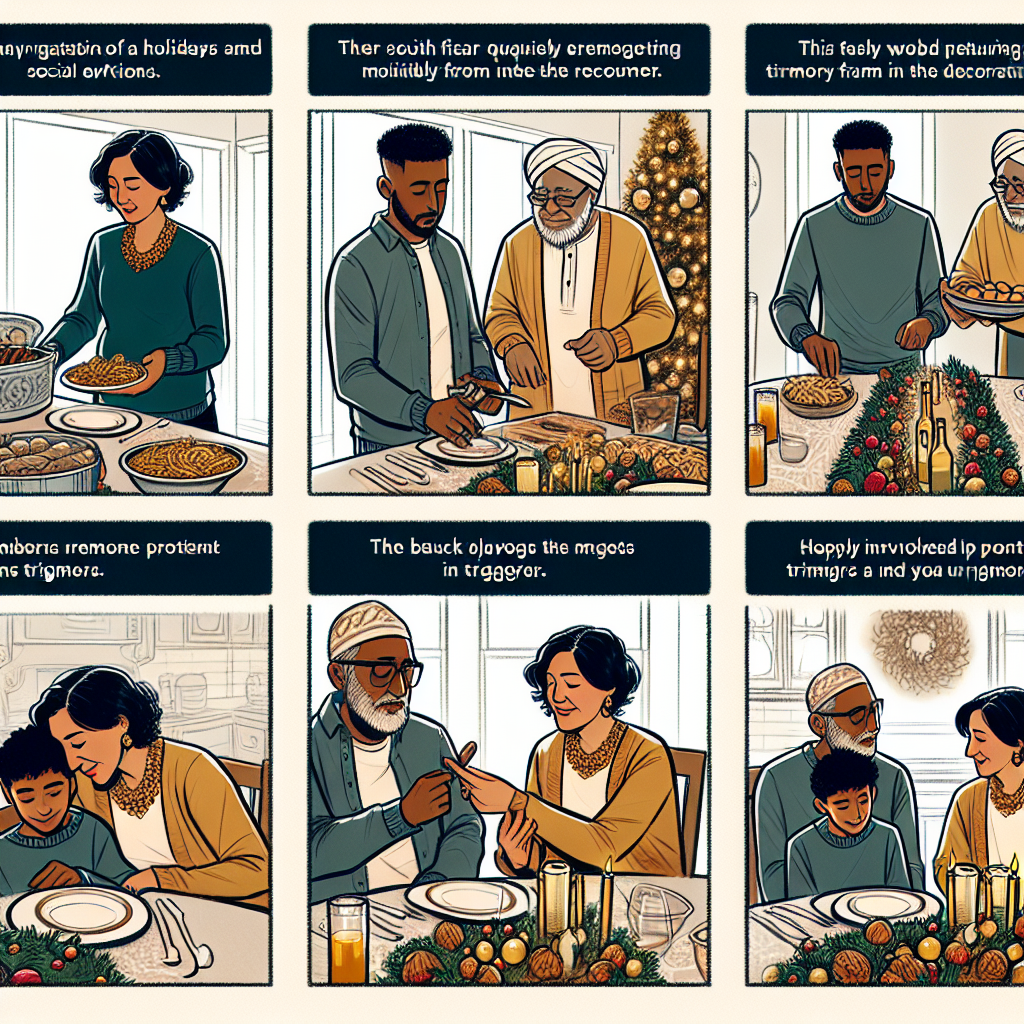-
Table of Contents

“Supporting Recovery, Celebrating Together: Navigating Holidays with Care”
Introduction
Navigating holidays and social events with a family member in recovery can be a delicate and challenging endeavor. These occasions, often marked by celebration, indulgence, and social interaction, can present unique triggers and stressors for someone working to maintain their sobriety. Understanding the complexities of addiction recovery and being mindful of the potential pitfalls during these gatherings is crucial. This introduction aims to provide insights and strategies to support a loved one in recovery, ensuring that holidays and social events remain joyous and inclusive while fostering a safe and supportive environment for their ongoing journey towards sobriety.
Strategies for Supporting a Family Member in Recovery During Holiday Gatherings
Navigating holidays and social events with a family member in recovery can be a delicate balancing act, but with thoughtful planning and compassionate support, these gatherings can become opportunities for connection and healing. The festive season, often synonymous with indulgence and celebration, can pose significant challenges for someone in recovery. However, by adopting a few strategic approaches, you can help create an environment that is both supportive and enjoyable for everyone involved.
First and foremost, open communication is key. Before the event, have a candid conversation with your family member about their needs and concerns. This dialogue can help you understand their triggers and preferences, allowing you to make informed decisions about the event’s structure. For instance, if alcohol is a trigger, consider hosting an alcohol-free gathering or providing plenty of non-alcoholic options. This small adjustment can make a world of difference in making your loved one feel comfortable and included.
In addition to modifying the environment, it is crucial to set realistic expectations. Recovery is a journey, and it is important to recognize that your family member may have good days and bad days. Encourage them to set boundaries and to listen to their own needs. If they need to leave early or take a break, support their decision without judgment. This flexibility can alleviate pressure and help them feel more in control of their recovery process.
Another effective strategy is to create a support system within the event. Identify a few trusted family members or friends who are aware of the situation and can offer additional support. This network can provide a sense of security and ensure that your loved one has someone to turn to if they feel overwhelmed. Moreover, having allies who understand the importance of maintaining a supportive environment can help reinforce positive behaviors and discourage any potentially harmful activities.
It is also beneficial to incorporate activities that do not revolve around substances. Engaging in games, crafts, or outdoor activities can shift the focus away from drinking or other triggers and provide a healthy distraction. These activities can also foster a sense of togetherness and create lasting memories that are not centered around substance use.
Furthermore, practicing empathy and patience is essential. Recovery is a deeply personal and often challenging journey. By showing understanding and compassion, you can help your family member feel valued and supported. Avoiding judgmental language and offering words of encouragement can go a long way in boosting their confidence and reinforcing their commitment to recovery.
Lastly, it is important to take care of yourself as well. Supporting a loved one in recovery can be emotionally taxing, and it is vital to ensure that you are also attending to your own well-being. Seeking support from friends, support groups, or a therapist can provide you with the tools and resilience needed to be an effective support system.
In conclusion, navigating holidays and social events with a family member in recovery requires a blend of empathy, communication, and strategic planning. By creating a supportive environment, setting realistic expectations, and fostering open dialogue, you can help your loved one feel safe and valued during these gatherings. Remember, the goal is to celebrate togetherness and create positive experiences that contribute to their ongoing journey of recovery. With patience and understanding, these events can become a source of joy and connection for everyone involved.
Creating a Sober-Friendly Environment for Social Events and Celebrations
Navigating holidays and social events with a family member in recovery can be a delicate balancing act, but creating a sober-friendly environment is not only possible, it can also be deeply rewarding. The first step in fostering such an environment is understanding the unique challenges that your loved one faces. Recovery is a journey that requires constant vigilance, and social gatherings often present temptations that can be difficult to resist. By being mindful of these challenges, you can take proactive steps to ensure that your celebrations are inclusive and supportive.
One effective strategy is to openly communicate with your family member about their needs and preferences. This conversation can help you understand what specific triggers they might encounter and how best to avoid them. For instance, if alcohol is a significant temptation, consider hosting an alcohol-free event or providing a variety of non-alcoholic beverages that are just as festive and enjoyable. This small adjustment can make a world of difference in helping your loved one feel comfortable and included.
In addition to modifying the drink menu, think about the overall atmosphere of the event. Creating a space that emphasizes connection and shared experiences over substance use can be incredibly beneficial. Activities such as games, music, and storytelling can serve as engaging alternatives to drinking. By focusing on these elements, you not only support your family member in recovery but also enrich the experience for all attendees.
Another important aspect is to educate other guests about the importance of a sober-friendly environment. While it may not be necessary to disclose your family member’s recovery status, a general request for sensitivity and support can go a long way. Encourage guests to bring non-alcoholic beverages and to be mindful of their language and behavior. This collective effort can create a more inclusive and understanding atmosphere.
Moreover, consider the timing and structure of your event. Daytime gatherings or events centered around meals can naturally reduce the emphasis on alcohol. If your celebration does include alcohol, designate specific areas where it is served, allowing those who prefer to avoid it to have their own space. This thoughtful planning can help mitigate potential triggers and make the event more enjoyable for everyone.
It’s also crucial to have a plan in place for moments when your family member might feel overwhelmed. Establish a quiet area where they can retreat if they need a break from the festivities. Additionally, having a trusted friend or family member available to offer support can provide an extra layer of comfort and security.
While these steps are essential, it’s equally important to celebrate the progress and resilience of your loved one. Acknowledge their journey and the strength it takes to maintain sobriety, especially during social events. This recognition can be incredibly empowering and affirming, reinforcing their commitment to recovery.
Ultimately, creating a sober-friendly environment for social events and celebrations is about fostering a sense of community and support. By being mindful of the challenges your family member faces and taking proactive steps to address them, you can create a space where everyone feels valued and included. This approach not only supports your loved one in their recovery but also enriches the experience for all, making your gatherings more meaningful and memorable. Through empathy, communication, and thoughtful planning, you can navigate holidays and social events with grace and compassion, ensuring that your celebrations are both joyous and supportive.
Q&A
1. **Question:** How can you support a family member in recovery during holiday gatherings?
**Answer:** Plan alcohol-free activities, communicate openly about their needs, and create a supportive environment by avoiding triggers and offering emotional support.
2. **Question:** What strategies can help a family member in recovery manage social events?
**Answer:** Encourage them to bring a sober companion, have an exit plan if they feel uncomfortable, and practice responses to decline offers of alcohol or drugs.
Conclusion
Navigating holidays and social events with a family member in recovery requires careful planning, empathy, and open communication. It’s essential to create a supportive environment that respects their boundaries and avoids triggers. This may involve modifying traditional celebrations, offering non-alcoholic options, and being mindful of the emotional challenges that such events can pose. By prioritizing the well-being of the family member in recovery, families can foster a sense of inclusion and support, ultimately contributing to their ongoing journey towards sobriety and overall mental health.



